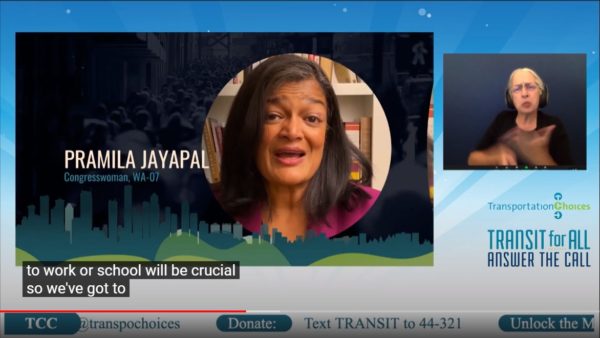TCC has received a lot of questions about our virtual events and how we’ve pivoted during the pandemic. TCC’s admin team is here to give a three part, behind-the-scenes look at how we do what we do.
Our event design principles focus on three key elements: Accessibility, Equity, and Creativity. This is TCC’s event design secret sauce that creates rad events that lead with our values. Each post in the series will take a deep dive into one of these elements. With that, let’s get going.

Image description: Computer screenshot of TCC’s annual event “Transit for All.” Congresswoman Jayapal talking, ASL interpreter signing in upper right corner, and captioning on the bottom left of the screen. Text on the bottom that reads: TCC @transpochoices, Donate: Text TRANSIT to 44-321.”
Our accessibility principles center disability access. This is a journey where our successes stem from our failures. TCC has amazing partners that continue to help us learn: Disability Rights Washington, Rooted in Rights, and all of the friends to TCC who have given us feedback along the way.
TCC’s goal is to be accessible by design. Designing with inclusivity means you don’t have to retrofit materials AND they are often better for everyone. Below is a list of tips, tools, and resources we have gathered to help share our learning and create a better virtual experience for everyone.
State what accessibility looks like for an event. Invitations, websites, registration pages, or anything that invites guests should provide basic accessibility information. When we hosted in person gatherings this looked like a statement on gender neutral bathrooms or venue limitations (i.e. stairs, ADA parking available, interpreters, etc). In the virtual space this looks like captioning, ASL and language interpreters, and other technology needs (color contrast, screen readable materials, understanding screen readers and Zoom, etc) that allow attendees to fully participate. TCC lists the accommodations we provide as a standard and we add a section on our event registration forms for additional accommodation requests with an internal commitment to meet each request and incorporate them into standard accommodations.
Provide materials in advance. Slideshows, videos, or anything shared on screen should be provided before the event so that people have the opportunity to review them at their own pace and use the tools they may have (ie: screen reader or translator) to follow along and participate. It also gives guests time to reach out if the materials aren’t working for them.
Make materials accessible. Slideshows, PDFs, and websites should all be accessible. Anything that is shown on screen in a visual format should also be available in an audio format and vice versa! Images should always include alternative text describing what is shown. Videos that include content displayed only visually should include audio descriptions. If there is a handout with a lot of visualizations or where the text may not be easily read by a screen reader, consider including a text-only version of the document.
To the extent possible, TCC designs screen layout around captions and interpreters so these accessibility features feel seamless. TCC’s Transit for All: Answer the Call virtual fundraising event is an example of screen layout design.
These are some helpful guides we’ve used for creating more accessible Word documents, getting started with web accessibility, and many, many additional tools out there to check everything from contrast to screen reading ability.
Include captions with video. Captions ensure videos are accessible for people who are deaf or hard of hearing and also improve the experience for non-native English speakers, people who process information at different speeds or methods, and people with poor computer audio connections. Captioning also makes it possible to generate a transcript for after the event.
There are many captioning services available, it depends on your video service. TCC uses auto-generating captions through 3Play Media for Zoom events, and uses YouTube captions for post-event. Zoom also has the ability to assign someone to type captions. Some other options out there are Rev.com, Total Caption, and Veed.io. When possible, TCC opts for open captioning.
Provide translation and interpreters. This is an area for growth for TCC’s in-person and virtual events. We are learning how we can expand beyond English as the only language heard at our events. We have added a section in our registration page where attendees can request an interpreter, thanks to feedback from our partners at Duwamish River Cleanup Coalition.
In 2020, TCC included American Sign Language (ASL) interpretation through the Hearing, Speech & Deaf Center at our annual event and are looking at ways to provide multiple language interpretation in the future. To get there, TCC must make language interpretation a budget priority and our administrative team is busy finding ways to resource this area of growth and our events committee is working to bring a wider range of languages to our programming.
We want to highlight a cool organization that was established during the COVID-19 Pandemic Interpret This!. Interpret This! provides ASL interpreting through a broad and diverse range of Interpreters of color and is addressing the disparities of Black Indigenous People of Color (BIPOC) interpreters. The next post in this series will speak to equity in event design but TCC knows that accessibility and racial equity are intersectional and connected.
There are very real, painful consequences of not designing with accessibility. The first of which is that attendees cannot attend, are not able to fully participate, or feel like an afterthought (because they are). For event planners this can feel like an additional thing to get done in already tight deadlines or it just doesn’t get done and goes on the to-do list for “next time”. When we pause to think about the humans behind the accessibility accommodations, it hurts to treat someone that way.
TCC is committed to making our events accessible because we care about our community and we understand that it benefits everyone. This is a lesson learned from disability rights activists and one of our favorite built environment pieces: The unassuming curb cut. Learn more by reading this article about the Curb Cut Effect.
Did we miss anything? Let us know how we can continually improve our event accessibility by filling out our contact form.
This post is sponsored by HomeLight:
Image description: HomeLight logo, light blue and dark blue circle in shape of a house with windows, with dark blue text that reads “HomeLight.”





